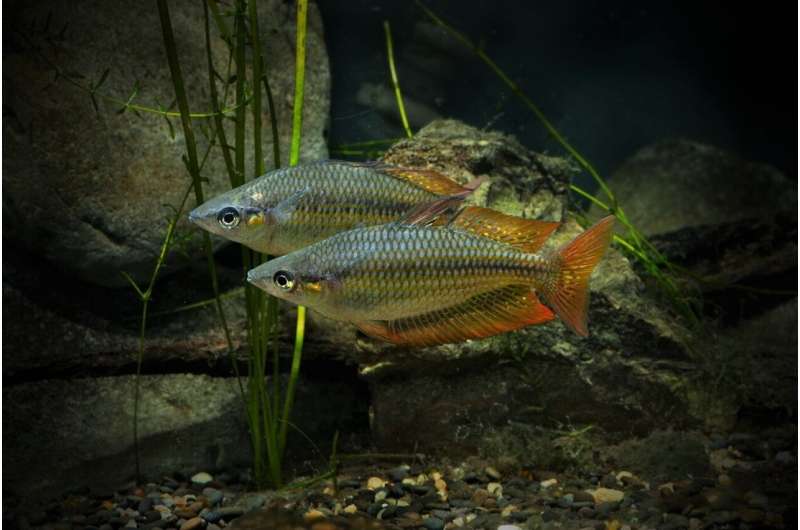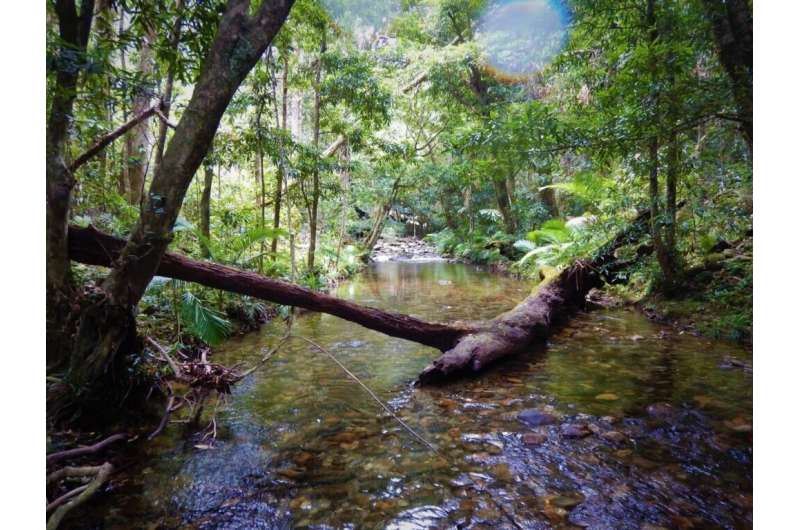How rainforest fish adapt to local conditions

The future of freshwater fish species in Australia’s tropical rainforest areas, including the Daintree and Mosman Gorge, will increasingly be subject to the vagaries of climatic and other changes.
Flinders University molecular ecology researchers have led an in-depth study of the colorful eastern rainbowfish for clues about how their populations have adapted to local conditions in the creeks and rivers of the wet tropical areas of Far North Queensland.
Their study, published in Heredity, provides insights into what drives genetic diversity in Australian eastern rainbowfish (Melanotaenia splendida splendida)—highlighting the ways their biodiversity may be affected, and conserved, particularly with any increase in climate change rates.
“Tropical rainforests are home to a staggering variety of plants and animals, ranking them among Earth’s greatest biodiversity hotspots,” says postdoctoral research fellow Dr. Katie Gates, first author on the new paper.
“We need to understand this diversity to prepare for any acceleration in habitat change under climate change and other forces.”
Biologists from the Flinders University Molecular Ecology Lab, University of Canberra and Canada’s Université Laval used a combination of genetics and morphology (the study of physical shape) to investigate how different environmental factors might influence variations among wild populations of these fish.
“We found that, while limited connectivity among different river catchments could explain some of the genetic differences, environmental factors like water flow and temperature offered a better explanation for the patterns overall,” says Dr. Gates.

The eastern rainbowfish, which is naturally abundant in tropical Queensland, is known for its striking variety of colors and forms, contributing to its popularity with aquarium keepers as well as scientists.
The study showed that hydrological and thermal variables were important environmental predictors of both genetic and morphological variation.
Project coordinator, Flinders University Professor Luciano Beheregaray, says an interesting aspect of this variation was related to fin position, which is known to be heritable in other rainbowfish species and varies among populations living in different streamflow environments.
“These patterns suggest that populations in different parts of the Wet Tropics may have adapted to their local environments in unique ways,” he says.
“Unfortunately, this also indicates that future changes in water flow and temperature due to climate change could have a big impact on the fitness and diversity of tropical rainforest fishes.”
Overall, the study demonstrates the complex interplay between genetics, morphology and ecology in shaping the diversity of a tropical rainforest species.
By understanding how these factors interact, we can develop more effective conservation strategies that take into account the unique challenges facing these biodiverse ecosystems.
The article, “Environmental selection, rather than neutral processes, best explain regional patterns of diversity in a tropical rainforest fish,” has been published in Heredity.
More information:
Katie Gates et al, Environmental selection, rather than neutral processes, best explain regional patterns of diversity in a tropical rainforest fish, Heredity (2023). DOI: 10.1038/s41437-023-00612-x
Citation:
How rainforest fish adapt to local conditions (2023, April 14)
retrieved 14 April 2023
from https://phys.org/news/2023-04-rainforest-fish-local-conditions.html
This document is subject to copyright. Apart from any fair dealing for the purpose of private study or research, no
part may be reproduced without the written permission. The content is provided for information purposes only.
For all the latest Science News Click Here
For the latest news and updates, follow us on Google News.

